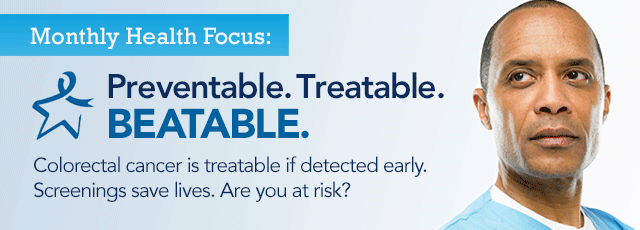Health Focus: Colorectal Cancer Content

Are you at risk?
Colorectal cancer is cancer that starts in either the colon or rectum. It may take years to develop and usually begins as a polyp — a growth of tissue in the center of the colon or rectum. Removing the polyp early may prevent it from becoming cancerous.
More than 140,000 people will be diagnosed with colorectal cancer this year. It is the second leading cause of cancer-related deaths in the United States.
Risk Factors
Age is the primary risk factor. Over 90 percent of cases are found in people over age 50. If everyone aged 50 and older had regular screening tests, at least 60% of deaths from colorectal cancer could be avoided.
Other risk factors include:
A personal or family history of the disease, polyps or bowel disease
- Smoking
- Diabetes
- Alcohol consumption
- Obesity
- Lack of exercise
- A high-fat/low-fiber diet
Early Detection
Several methods exist for detecting colorectal cancer early. Beginning at age 50, your doctor may suggest one or more of the following tests. Those at high risk may need earlier or more frequent testing.
- High-sensitivity fecal occult blood test (FOBT), such as fecal immunochemical test (FIT) (once a year)
- Flexible sigmoidoscopy (every five years)
- Colonoscopy (If normal, repeat every ten years.)
Highlight on the FIT test
The fecal immunochemical test (FIT) is a test you do at home. It works by detecting small amounts of blood in the stool. The FIT screening is more convenient than earlier stool tests. It can be performed in five minutes, without any prep the night before. However, this home-based screening doesn't detect polyps as well as colonoscopies. If you are at high risk for colorectal cancer or over the age of 50, ask your doctor is this test is right for you.
Prevention
It is not yet clear what causes colorectal cancer. Lower your risk by eating plenty of fruits, vegetables and whole-grain foods while limiting high-fat foods, as well as exercising at least 30 minutes a day, five days a week.
Warning Signs and Symptoms
Colon cancer usually doesn't have any symptoms in the early stages. That is why it is important to get screened appropriately. If you experience any of the following, you should see you doctor immediately:
- Rectal bleeding
- Blood in the stool
- Lower abdominal cramping that doesn't go away
- Losing weight and you don't know why
Treatment
Surgery is the most common form of treatment and the most successful — if performed before the cancer spreads. Chemotherapy, and possibly radiation, may be given to patients whose cancer has spread to other areas.
For more information about colorectal cancer:
The American Cancer Society (www.cancer.org) 1-800-ACS-2345
Centers for Disease Control and Prevention (www.cdc.gov/screenforlife) 1-800-CDC-INFO
Colon Cancer Alliance (www.ccalliance.org) 1-877-422-2030
National Cancer Institute (www.cancer.gov) 1-800-4-CANCER
